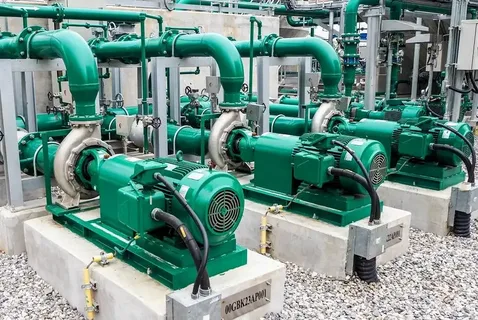Industrial Pumps Explained: Key Types, Applications, and Advantages
Industrial pumps are crucial components used across various industries for moving fluids, slurries, and gases. Whether in the oil and gas sector, manufacturing plants, or wastewater management systems, these pumps facilitate smooth operations by ensuring fluid transfer without disruption. In this guide, we will explore the different types of industrial pumps, their uses, and why they are vital in maintaining operational efficiency in various industries.
What Are Industrial Pumps?
An Industrial Pump is a mechanical device designed to move fluids (liquids or gases) from one location to another within a system. These pumps are essential in a wide range of applications, from circulating water in cooling systems to transferring chemicals in factories. They come in various types, each tailored to specific tasks based on the fluid type, flow rate, and pressure requirements.
Types of Industrial Pumps
Industrial pumps come in several types, each designed for different fluid handling tasks. Here are the most common ones:
Centrifugal Pumps
Centrifugal pumps are one of the most widely used types of pumps in various industries. They operate by using rotational energy from a motor to impart velocity to the fluid, converting it into pressure. These pumps are ideal for handling large volumes of fluid at low to moderate pressure.
Common Applications: Water treatment, chemical processing, oil refining.
Positive Displacement Pumps
Positive displacement pumps work by trapping a fixed amount of fluid and forcing it through the pump’s outlet. These pumps are suitable for handling highly viscous fluids or fluids that need to be moved at a constant rate, regardless of pressure fluctuations.
Common Applications: Food processing, pharmaceutical industries, heavy-duty liquid handling.
Diaphragm Pumps
Diaphragm pumps use a flexible diaphragm that moves back and forth to displace fluid. These pumps are often used for applications requiring high pressure and the transfer of harsh or corrosive fluids.
Common Applications: Chemical manufacturing, water and wastewater treatment, abrasive slurry handling.
4. Gear Pumps
Gear pumps use two or more gears that mesh together to displace fluid. These pumps provide smooth, continuous flow and are ideal for applications involving high viscosity fluids.
Common Applications: Oil lubrication systems, hydraulic systems, fuel transfer.
Peristaltic Pumps
Peristaltic pumps are ideal for pumping viscous or abrasive fluids without contaminating the fluid. They operate by squeezing a flexible tube to push the fluid forward, making them perfect for delicate applications.
Common Applications: Medical fluid transfer, food and beverage industries, and pharmaceutical applications.
How Do Industrial Pumps Work?
Industrial pumps work by utilizing various mechanisms to move fluids. Depending on the type, the working principle may involve centrifugal force, displacement, or compression. For example, in centrifugal pumps, the motor rotates a set of impellers, creating a high-velocity flow that moves the liquid. In positive displacement pumps, the pump traps and displaces a fixed amount of fluid during each cycle.
Benefits of Industrial Pumps
Industrial pumps offer several benefits that improve efficiency, productivity, and safety in industrial operations:
Efficiency: They enable the smooth transfer of fluids, minimizing downtime and optimizing processes.
Versatility: Pumps are available in many types, each suited for specific applications, from water to highly viscous chemicals.
Durability: Industrial pumps are designed to handle extreme conditions, making them long-lasting and reliable.
Cost-Effectiveness: By improving operational efficiency, pumps help reduce maintenance costs and operational inefficiencies.
Safety: Pumps are engineered to safely handle hazardous and corrosive fluids, ensuring that workplaces remain safe.
Factors to Consider When Choosing an Industrial Pump
When selecting an industrial pump, several factors should be considered to ensure optimal performance. These include:
Fluid Type: The nature of the fluid being pumped (viscosity, corrosiveness, etc.) influences the pump type.
Flow Rate: Determine the required flow rate to select a pump capable of handling the desired volume of fluid.
Pressure Requirements: Consider the pressure at which the pump must operate to ensure system efficiency.
Operating Conditions
Environmental factors, such as temperature and the presence of abrasive particles, should influence the pump selection.
Maintenance Needs
Look for pumps that are easy to maintain to reduce downtime and long-term costs.
Common Applications of Industrial Pumps
Industrial pumps are used in a wide variety of industries and applications. Here are some of the most common:
Oil and Gas Industry
In oil and gas, pumps are essential for moving crude oil, natural gas, and other fluids through pipelines, refineries, and distribution systems. They are used for drilling, transportation, and chemical processing.
Water Treatment
In water treatment plants, pumps are used to move water and chemicals throughout the treatment process, from raw water intake to filtration and chemical dosing systems.
Chemical Manufacturing
In chemical plants, pumps are used to transfer chemicals in various stages of the production process. These pumps handle everything from basic liquids to hazardous chemicals.
Food and Beverage Industry
Pumps in the food and beverage industry ensure that liquids, syrups, oils, and even powders are transferred efficiently. They are often used for bottling, mixing, and pasteurization processes.
Mining Industry
In mining operations, pumps handle slurry, water, and chemicals to support ore extraction, waste removal, and process control.
Maintenance of Industrial Pumps
To maximize the longevity and efficiency of industrial pumps, regular maintenance is crucial. Here are some common maintenance tasks:
Lubrication: Ensure that pumps are properly lubricated to reduce wear and tear on moving parts.
Inspection: Regularly inspect seals, gaskets, and bearings to prevent leaks and failures.
Cleaning: Remove debris or buildup that can affect pump performance.
Testing: Regularly test the pump to ensure it operates at optimal efficiency.
Conclusion
Industrial pumps play an essential role in a wide range of industries, ensuring smooth fluid transfer and maintaining operational efficiency. By understanding the different types of pumps and their applications, businesses can make informed decisions when selecting the right pump for their needs. Regular maintenance is key to ensuring the longevity and reliability of these critical components, keeping operations running smoothly and safely.













